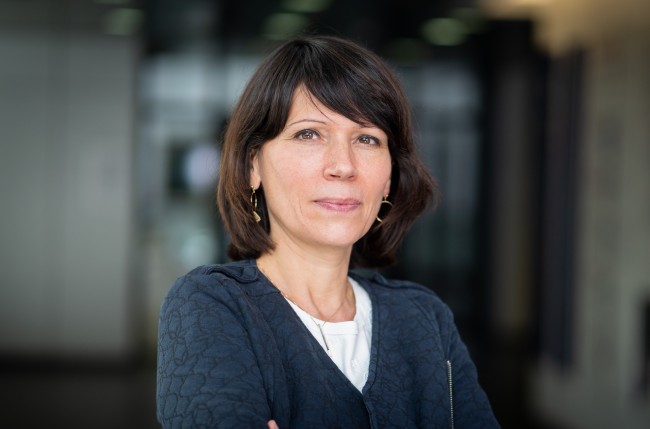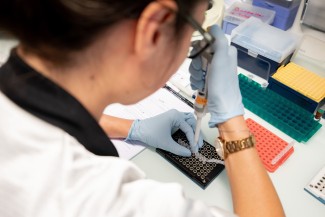Alzheimer's, Parkinson's, multiple sclerosis, brain tumours, amyotrophic lateral sclerosis (ALS), stroke, epilepsy, depression... Today, you can take action against brain diseases by giving a place on your will to the foundation Paris Brain Institute. Through your legacy, you will help the scientists, physicians and neuroscientists of Paris Brain Institute accelerate the pace of discovery. It is with you that we can overcome together the greatest challenge of the 21st century: to overcome brain diseases.
Here are the steps and points of attention in a process of transmission to a foundation such as Paris Brain Institute.
Know before you make a legacy
If you have children or a spouse the issue of hereditary reserve.
It’s important to know that your children or spouse, if you don’t have one, are considered to be reserved heirs. For them, the law provides for a "reserved" share, which they cannot be deprived of. You can freely dispose of a part, called "available share", which varies according to the number of children: half of your assets if you have only one child, a third if you have two children and a quarter if you have three or more children.
It is on this available quotity that you can decide to support in your will, the foundation Paris Brain Institute and the fight against brain diseases.
Note:
- If you do not have children or a spouse, you can freely divide all your assets according to your wishes.
- Parents, brothers, sisters, nephews, nieces, cousins are not reserved heirs. If they are designated as beneficiaries, they must pay the substantial inheritance tax: 45% between siblings, 55% between uncles/aunts and nephews/nieces or first cousins, 60% between relatives above the fourth degree and non-parents.
Giving a Legacy to the Foundation Paris Brain Institute
You can bequeath "movable" property such as money, a bank account, furniture, works of art…or "immovable" property such as an apartment, house, land…
Important: throughout your life, you retain complete freedom to dispose of the property that you plan to bequeath in your will. The transfer will take place after your death, on the heritage that will remain at that time.
Legend through the writing of a will
Wills allow you to express your wishes and define precisely what you wish to pass on after your death.
There are 2 forms of wills:
Probate wills
To simply make your will, you can write it yourself on a piece of paper. In this case, it must be written in your hand: it must always begin with "This is my will that revokes all previous testamentary dispositions ".
It should not be typed on a computer or written by someone close to you. You must also ensure that it is accurately dated (day, month and year) and signed.
If you designate a person in your will, give the person's first name, last name and address. If you are designating an organization, provide its name and address.

For example, to identify our Institute as the beneficiary of your bequest, the following wording should be included:
« L’Institut du Cerveau situé à l’hôpital de la Pitié-Salpêtrière – 47, boulevard de l’hôpital – 75013 Paris »
If you choose this form of testament called "olographe" (which means handwritten), we strongly advise you to register it in the Central Final Will Disposition File (FCDDV), also known as the "notaries file", which centralizes the existence of all wills received by notaries. This costs approximately €50.
To do this, you must hand over your will to a notary who will keep it and record the information related to the deposit of your will in this central file. He may also, if you wish, check with you beforehand that your will is in full conformity.
At the time of your succession, the first thing the notary responsible for settling the estate will do is to query this Central Registry, which will allow him quick access to your will. Registration in this File therefore ensures that your wishes will be respected, while a testament on free paper, left at your home, may disappear or not be found.
Note:
- The Central Registry can only be consulted after the death of the testator,
- The Central Registry does not reveal the contents of the will, but only its existence and place of deposit.
If you find that your family and property situation is complex, we advise you to opt for an "authentic" will instead of making an "olograph".
The will is said to be "authentic"
It is a will drawn up by a notary, based on the wishes you indicate to him. This will is made in front of two witnesses of your choice (who are not the legatees) or in the presence of a second notary. Automatically, the notary will register your will in the Central Registry of Final Will Dispositions.
Important:
You may change your will at any time, even if your will is registered in the Central Registry of Final Will Dispositions.
You want to add a provision, in which case you just have to write a "codicil" that begins: "Codicille to my will of the . I, the undersigned…, domiciled at…., confirm the terms of this will and add the following provisions…" In this case you must also register it, as a security measure, in the Central Registry of Final Will Dispositions.
If several codicils are written over the years, it is best to completely rewrite your will by cancelling all previous provisions.
Pour en savoir plus sur le legs
Pour lutter contre Alzheimer, Parkinson, tumeurs cérébrales, SLA, épilepsie, dépressions, AVC, sclérose en plaques…, il n’y a pas que les chercheurs qui font avancer la recherche.
Did you know?
If you do not make a will, and if you have only distant relatives (beyond the sixth degree), they will not be considered heirs by law and the whole of your estate will revert to the State.
Three forms of legacy
There are three types of bequests that can be made to the Institut du Cerveau – ICM foundation through the will:
The universal legacy: you bequeath all your possessions.
Example of Will Formulation for a Universal Legacy:
"This is my will that revokes all previous testamentary dispositions. I, the undersigned……(surname, first name), born at…………………, domiciled (address)……institute for universal legatary Paris Brain Institute, with its seat at the Pitié-Salpêtrière Hospital – 47 boulevard de l’hôpital – 75013 Paris. I bequeath to him all the movable and immovable property that will constitute my estate on the day of my death. Signed."
Discover our educational film on the universal legacy where Jacques, without children*, plans to pass all of his possessions to the Paris Brain Institute:
(*) : in the absence of a spouse or children (reserved heirs), you can transfer all your assets according to your wishes.
If you wish to bequeath to a distant relative (nephew/niece, cousin) or to a friend, as well as to Paris Brain Institute, it is advisable to designate the Universal Paris Brain Institute with the responsibility of returning, to your relative or friend, a special bequest net of fees and fees. Paris Brain Institute will pay the portion of the estate fees and the notary fees for the part that will go to your loved one. The rest of your legacy will go to the Paris Brain Institute > see example Universal bequest with care in the chapter below Your questions about the bequest, our answers.
Legacy for all: you bequeath a class of property
For example: all my real estate, or all my bank accounts), or a share of your assets (example: 30% of my wealth)
Special bequest: you bequeath one or more specifically designated properties
For example: an apartment, a bank account…)
No, the Institute never pays any estate tax.
In fact, Paris Brain Institute is a recognized Foundation of Public Utility (decree of 13 September 2006), entitled to receive bequests, donations and life insurance by being totally exempt from the payment of inheritance and transfer duties. All of what you give in a will, or as part of a life insurance policy, will therefore directly benefit brain research and the fight against brain diseases.
This is the universal bequest with charge.
To bequeath to a person who is a distant relative (nephew, cousin) or a relative who is not a family member (friend, daughter of a friend…), all you have to do is make a universal bequest to Paris Brain Institute by asking it to give a particular bequest (net of fees and rights) to that person. Paris Brain Institute will settle the portion of the estate fees and the notary fees in the person’s place. The rest of your legacy will go to the Paris Brain Institute.
We advise you to discuss this with your notary or to contact us before the will is written to verify its feasibility.
If you are a couple, and you wish to pass on your wealth to Paris Brain Institute when the last of you dies. You must each write a "cross" will (never a single will), as shown in the video.
No, it is not necessary to redo your will: you can simply make a codicil. It is a kind of addendum to the will that allows to add modifications, subject to date, sign and reference to the said will. If the changes are too great, it is best to make a new will.
So, all you have to do is write by hand:
"Codicil to my will of (date). I, the undersigned …..remain……add as a joint universal legatee equal to the other 2 already designated the Institut du Cerveau, located at the Hospital de la Pitié-Salpêtrière, 47 boulevard de l’Hôpital, 75013 Paris.
Dated at …… (place), this …… (date in all words). Signature"
As with wills, it is advisable to entrust your codicil to a notary and to request its registration in the central registry of final dispositions.
Here are the reasons that come up most often among our donors. There are mainly 4:
- “The best of both worlds”: located in the Hospital de la Pitié-Salpêtrière in Paris, Paris Brain Institute inherited the excellence of this hospital, the cradle of modern neurology. On the other hand, with 700 researchers from all over the world, Paris Brain Institute is a resolutely young and forward-looking institute. The foundations for predictive medicine have already been laid with the creation of our neuro-informatics centre capable of exploiting millions of clinical and medical imaging data.
- "Specialized research on the brain and all its diseases": to understand how the brain works and to fight all its diseases, researchers, biologists, geneticists, mathematicians, neurologists and psychiatrists, computer scientists, engineers, paramedics all work together at the Institute of Paris Brain Institute. Access to the Institute’s 10 leading-edge technology platforms is a real research accelerator for the 25 teams that collaborate with other prestigious teams around the world. Thanks to the incubator of Paris Brain Institute, Station F’s first health partner, advances are transformed into new treatments.
- "Direct access to our Institute": by supporting our Institute, our testers value having a direct relationship with our researchers. Visit our centre and follow in time the progress of this or that team. So those who have sometimes been tempted by foundations that offer a large panel of causes and for each of the multiple projects that vary each year, have preferred to stay with us over time.
- A unique and successful ecosystem: a joint research unit (UMR), Paris Brain Institute has since its creation adopted governance based on a strong public-private partnership with its public partners (INSERM, CNRS, Sorbonne-Université, AP-HP). In particular, it is the generosity of the public that enables researchers to collaborate on high-risk projects of their choice, supported by first-level technology platforms.
Finally, Paris Brain Institute has established an effective and transparent governance and organization with:
- a Board of Directors chaired by Prof. Gérard Saillant, President of Paris Brain Institute and 15 people from 4 colleges: the College of Founders, the College of Friends of the Foundation, the College of Qualified Personalities and the College of Ex-officio Members.
- a Scientific Council (SAB) which assists the Board of Directors or the Director General on major policy issues. It is composed of the best international experts in neuroscience. Every five years, Paris Brain Institute is evaluated by the High Council for the Evaluation of Research and Higher Education (HCERES) on the quality of its research work, its organisation, its strategy and its scientific projects at five years.
- a Committee on Ethics and Conduct
- the Don en confiance label, an organisation that has been professionally regulating the call for public generosity for 20 years. The principles of the charter are respect for the donor and his will, transparency, the search for efficiency and, finally, probity and disinterest in the accomplishment of our missions. Monitoring is ongoing and carried out by independent expert volunteer monitors. The renewal of the label, which takes place every three years, is subject to a general audit.
- oversight by an independent auditor
- the annual publication of a detailed activity and financial report.
Since the creation of Paris Brain Institute in 2010, crucial advances have already been made in understanding the brain and how to treat its diseases. These successes give us confidence in the future.
Tomorrow, thanks to new technologies and the next discoveries of our researchers, we will be able to prevent and cure diseases that are currently incurable: Alzheimer’s, Parkinson’s, multiple sclerosis, epilepsy, brain tumours, stroke, ALS, rare neurological diseases, etc.
One in eight people is affected by one of these diseases, representing 1 billion people worldwide. This is considerable. This is a major public health issue and we need everyone’s support to address it.
By making a legacy, you will allow neuroscience research to continue and invent the world of tomorrow.
Thank you very much for this act of generosity for future generations.
Invest in research and let the younger people around you never know about these diseases.
Nous contacter
Une équipe à votre écoute
Vous vous posez des questions sur le legs ?
Carole CLÉMENT, responsable de la relation avec les testateurs, et Marion BOULETIN, diplômée notaire, responsable des libéralités à l’Institut du Cerveau, sont à votre disposition pour répondre à vos questions ou échanger sur votre projet de legs, un geste fort pour l'avenir de la recherche en neurosciences.
Leur rôle est de vous aider dans votre réflexion, de vous apporter des informations sur l’Institut (son financement, ses équipes de recherche, ses avancées majeures, ses grands défis à venir…) ou vous le faire découvrir à travers une visite ou une rencontre avec des chercheurs.
Elles peuvent également vous accompagner dans votre démarche, par exemple avec des conseils sur la rédaction du testament, en toute confidentialité et sans engagement de votre part, ou encore recueillir d’éventuels souhaits particuliers. L’Institut du Cerveau aura toujours à cœur de respecter vos volontés.

Vous avez une question sur le legs ? Vous souhaitez recevoir notre brochure d’information par courrier ? Vous voulez échanger sur votre projet ?
Pour tout renseignement, contactez Carole CLÉMENT, responsable des relations avec les testateurs.
01 57 27 41 41 - Carole.clement@icm-institute.org

